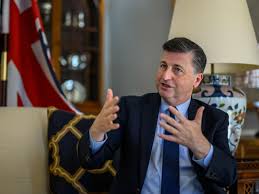Britain aims to reset trade relations with EU

Britain is urgently seeking to reset its trading relationship with the European Union, viewing international commerce as essential for reviving UK growth, trade minister Douglas Alexander told AFP.
Alexander stated that Britain’s 2016 vote to leave the EU caused “significant disruption” to its trade policy, emphasizing the need to recalibrate the country’s global trade outlook, as APP reported.
He was in Geneva on Monday to meet with the head of the World Trade Organization (WTO) as part of a plan to develop a revamped, long-term UK trade strategy set to be published in spring 2025.
“The fact that this is my first European visit is an indication of the incoming government’s strong commitment to the WTO and the multilateral trading system,” said Alexander.
British Prime Minister Keir Starmer’s centre-left Labour Party came to power with a substantial parliamentary majority in July elections that ousted the Conservatives after 14 years and five prime ministers.
Alexander noted that Britain would therefore be “the most politically stable democracy in the G7” over the coming years, adding that while this “doesn’t guarantee economic stability and progress, it certainly helps.”
“We are very keen as a new government to both reset our relationship with our friends and partners in the EU and also to continue to pursue free trade agreements and new opportunities with markets around the world,” he said.
Alexander emphasized that trade growth plays a “critical role” in the Starmer government’s “defining mission” to grow the British economy. “Trade is one of the tools in the toolkit as we look both to bring economic stability and fiscal stability,” he added.
Britain’s economy grew by 0.5% in the second quarter of 2024, recovering from a shallow and short-lived recession in the second half of the previous year.
“The numbers continue to be very tough in terms of the immediate post-Brexit trade consequences, but it’s a reality that 47% of the UK’s trade is still with the EU. So there is an urgency to resetting our relationship,” Alexander stated.
“Part of the reason for my visit to Geneva was to listen and to learn, and to frame in my mind how to think about the place of the WTO in my emerging thinking around the trade strategy,” he explained.
The EU is one of the 166 WTO members, but after Britain left the bloc in 2020, London now negotiates for itself at the Geneva-based global trade body.
“We’ve got an ambitious agenda to unlock opportunities beyond the EU while also seeking to reset a relationship with the EU,” said Alexander.
He highlighted that Britain is an 81-percent services-based economy with a “huge national interest” in growing digital trade.
The minister views the WTO as an “indispensable institution of international cooperation” and strongly supports director-general Ngozi Okonjo-Iweala’s bid for a second four-year term when her mandate expires in August. Alexander expressed admiration for her stewardship of the WTO, stating that the Nigerian former finance minister has brought “authority, credibility, and capability” to an organization often branded as sclerotic.
He added that the multilateral trading system would be “the foundation of a great deal of what we’re aiming to do in our trade strategy moving forward.”
Earlier this month, the WTO lowered its global goods trade growth forecast for 2025 to 3% from 3.3%.
Alexander acknowledged that although international trade has faced “significant headwinds” in recent years, “global growth has still been more anaemic than any of us would have wished to see.”





